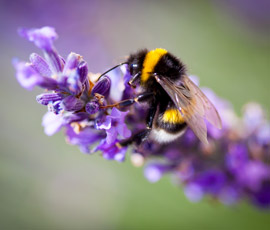Bee decline in UK blamed on intensive farming

Intensive farming and urban development have been identified as two “key reasons” for bee decline in the UK over recent years, according to a new study.
Britain has more than 250 bee species, but numbers have fallen dramatically due to disease, an increase in chemical use among farmers and habitat loss, says the Iconic Bees report from the University of Reading, commissioned by Friends of the Earth (FoE).
The report, published on Thursday (9 May), says ongoing agricultural intensification and change of landscape represents the “main threat” to some of Britain’s most iconic bees, such as the Large Garden Bumblebee and the Potter Flower Bee.
But the NFU said the report was an unfair attack on farming that failed to take into consideration all the good work farmers have done under agri-environment schemes to improve farm biodiversity.
The study focuses on 12 iconic bee species and warns that some of the UK’s most iconic bees are in “serious decline” from Scotland to south-west England.
Britain’s rarest solitary bee, the Large Mason Bee, is “on the brink of extinction” in Wales, says the report. The Potter Flower Bee is suffering “dramatic decline” and is now “clinging on in a handful of sites along the south coast”.
The Great Yellow Bumblebee has disappeared from 80% of its historic UK range and the Bilberry Bumblebee is suffering, “most likely due to the loss of its vital food plant, wild bilberry”.
“The way we farm and use land across the UK has pushed many rare bees into serious decline,” said Simon Potts, a leading bee expert from the University of Reading. “I’m calling on the government to act swiftly to save these iconic creatures which are essential to a thriving environment and our food supply.”
Bees are vitally important to agriculture for pollinating our food crops and maintaining biodiversity in the rural environment. A separate FoE report has estimated bees are worth £510m a year to the UK economy.
FoE bees campaigner Sandra Bell said: “These bee species are in real trouble. But people across the UK can help change all that with simple practical actions and by urging their MPs to play their part. We need a bee action plan now.”
The partial European ban on three neonicotinoid pesticides, linked to bee death, will not solve bee decline without further immediate action to deal with all its causes, the report warns.
But Chris Hartfield, NFU lead scientist on bee health, accused FoE of using the bee health issue as a means to recruit new members.
“I’m surprised that Friends of the Earth is now switching its focus and blaming other reasons for the decline in bee numbers after undertaking a single-issue campaign against neonicotinoids,” said Dr Hartfield.
“They fail to acknowledge that farming has a considerable amount to offer in terms of overcoming a lot of challenges faced by bees and other pollinators, not only through providing them with the habitat and resources, but through things like agri-environment schemes.
“Farmers have already put in place 150,000ha that will provide habitat/food resources for bees. Yes, there is more that could be done, but the right incentives have to be in place to encourage it. There needs to be an acknowledgment that if action has a cost, then who is going to bear that cost?”
Dr Hartfield added that bee decline was a “multi-factorial” issue, as the FoE report states, which raised the question why the European Commission thought it was necessary to ban neonicotinoids.
“Researchers have looked for harmful effects of neonicotinoids (on bee health) under field conditions, but they haven’t been able to find any,” he said. “If you cannot detect these harmful effects we will not be able to measure the benefits of restricting neonicotinoids. It begs the question: why we are restricting these important products?”
A DEFRA spokesperson said: “We completely agree that there are many issues affecting bees and said clearly that banning neonicotinoids won’t help. “We are doing a lot of work to support bees through the Healthy Bees Plan for honeybees, work on habitats, funding for new research into bee health and support for agri-environment schemes to support bee-friendly farming.”

